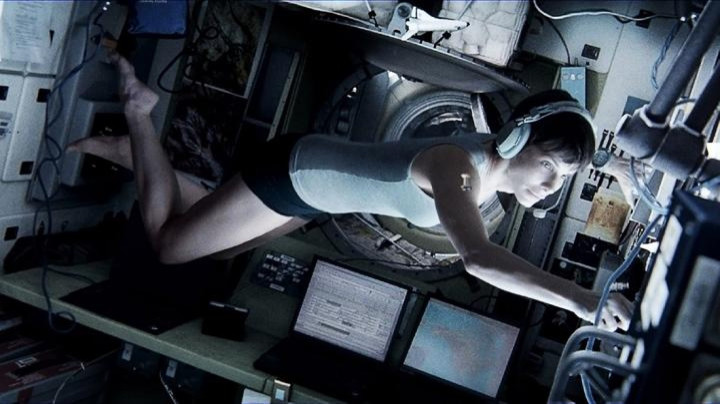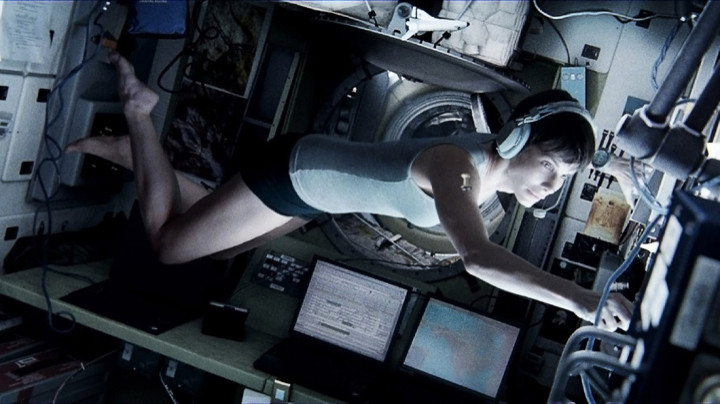'Gravity' Movie Review: Alfonso Cuaron’s Space Oddity Is A Visual Masterpiece


An aspiring space explorer might find in “Gravity” a checklist of how to prepare for the unexpected in deep space. Learn Russian, and while you're at it, Chinese. Practice holding your breath for long stretches. Build that upper-arm strength. Reconsider the giant American flag on the International Space Station (I can't tell you why.)
Alfonso Cuaron's (“Children of Men,” “Y Tu Mama Tambien”) 90-minute nail-biter masterfully blends Big Questions into a no-nonsense, step-by-step struggle for survival, in stunning 3D. When we first meet veteran astronaut Matt Kowalaski (George Clooney) and respected biomedical engineer Dr. Ryan Stone (Sandra Bullock), they're cheerfully exchanging quips with Houston during the final leg of a routine space shuttle mission – Dr. Stone's first. Soon, there is word that a Russian satellite has accidentally exploded and the debris is heading their way. The collision destroys life and property in a spectacular fashion, and it won’t be the last time the shrapnel will enter their orbit. The surviving explorers are blasted deeper into space. Communication with mission control is severed, and the pair is left to its own devices.
Though their world is rather literally shaken to the core, Kowalaski and Stone remain, for the most part, steady. After all, keeping it together is a matter of life and death. Kowalaski is warm and chatty, Stone is at once stubborn and deeply unsure of herself. Both are well-meaning and self-sacrificing, Kowalaski a touch more. Their survival at first depends on clinging to each other, and later it depends on letting go. Cuaron keeps the heavy-handed metaphors to a merciful minimum, but there are enough clues that the movie's title refers to much more than just the absence of weight in space. [SPOILERS AHEAD]
It's pretty clear from the start that things are not going to end well for everyone involved. A repeated refrain is a variation of “I've got a bad feeling about this.” And so will you. But like the sanguine Kowalaski, who marvels at the sun over the Ganges when there are more pressing matters to consider, you might also find comfort in the beauty of the infinite cosmos and the promise of what may lie beyond.
In a review of Baz Luhrmann's “The Great Gatsby,” the first film I had ever seen in 3D, I complained that the special effects were an annoyance and a distraction from the narrative. The direct opposite can be said of “Gravity.” Watching it on an IMAX screen feels like the only way to experience it. The minimalist script relies wholly on the immersive visual and audio effects, at times observed from the POV of a woman lost in space and rapidly losing oxygen. While Bullock gasps for breath, you may notice you are holding yours. You might also catch yourself ducking out of the way of satellite debris hurtling toward you from the screen, which in an IMAX theater doesn't feel like a screen at all. But the true majesty of “Gravity” is in its moments of stillness, as the spacewalkers drift miles and miles above a silent planet, with only the universe to keep them company.
Those of us who have never traveled beyond the earth's atmosphere – hell, maybe even those who have – will be easily convinced that Cuaron's outer space is the real deal. “Gravity” looks less like a vivid rendering of our informed imaginations than a glimpse into a perfectly reasonable future that permits continued space travel captured by the kind of sharp, brilliant photography cinematographer Emmanuel Lubezki gives us here. (Okay, maybe not that reasonable.) Because of this and more, “Gravity” never feels like a science-fiction movie. It's an adventure – one that sometimes slips into melodrama – that is set in outer space. Like all melodramatic adventures, plausibility is at a premium. And that's mostly okay, particularly because most of us aren't in a position to argue minutia of the laws of physics. But while I forgive Cuaron and his son Jonas, who co-wrote the script, for liberties they took with the story, I am much less tolerant about some of the dialogue. Much of it is grating and hokey, especially when Dr. Stone is talking to herself.
Bullock won an Oscar in 2010 for her performance in “The Blind Side,” an honor that drew as many scoffs as it did cheers (she won a Razzie the same year for her turn in “All About Steve”). The actress does a fine job here, and we may be seeing her on the awards circuit again next year, but I can’t in good faith call her performance a tour de force -- though she alone may not be to blame. Bullock's camp has always played up her girl-next-door appeal over sex appeal, and Bullock herself has never insisted that we take her all that seriously. And here, in the most serious role of her career, Bullock’s sensuality seems to be a preoccupation; the camera has never loved her bare legs more. At points, “Gravity” seems to demand that we contemplate her flawless skin and how many hours a day she must log at the gym/yoga studio, all while her character is contemplating life and death. What to make of that I don't know. Clooney is as Clooney always is: an unintimidating delight.
Few can resist an association between the cosmos and a celestial afterlife, even if we don't believe in one. Cuaron doesn't try to resist, nor does he ask us to. In fact, he presents the notion of something like heaven as self-evident. And why not? Maybe once you're untethered from gravity, it's easy to believe that anything's possible.
"Gravity" opens in theaters nationwide on Oct. 4. Watch the trailer here:
© Copyright IBTimes 2024. All rights reserved.






















